Entrepreneurial Ventures and their Impact on the Economy
VerifiedAdded on 2023/01/19
|15
|4491
|20
AI Summary
This report focuses on different types of entrepreneurial ventures and their impact on the economy. It discusses the characteristics and skills of successful entrepreneurs that set them apart from business managers. The report also highlights the importance of small businesses and startups in the growth of the social economy.
Contribute Materials
Your contribution can guide someone’s learning journey. Share your
documents today.
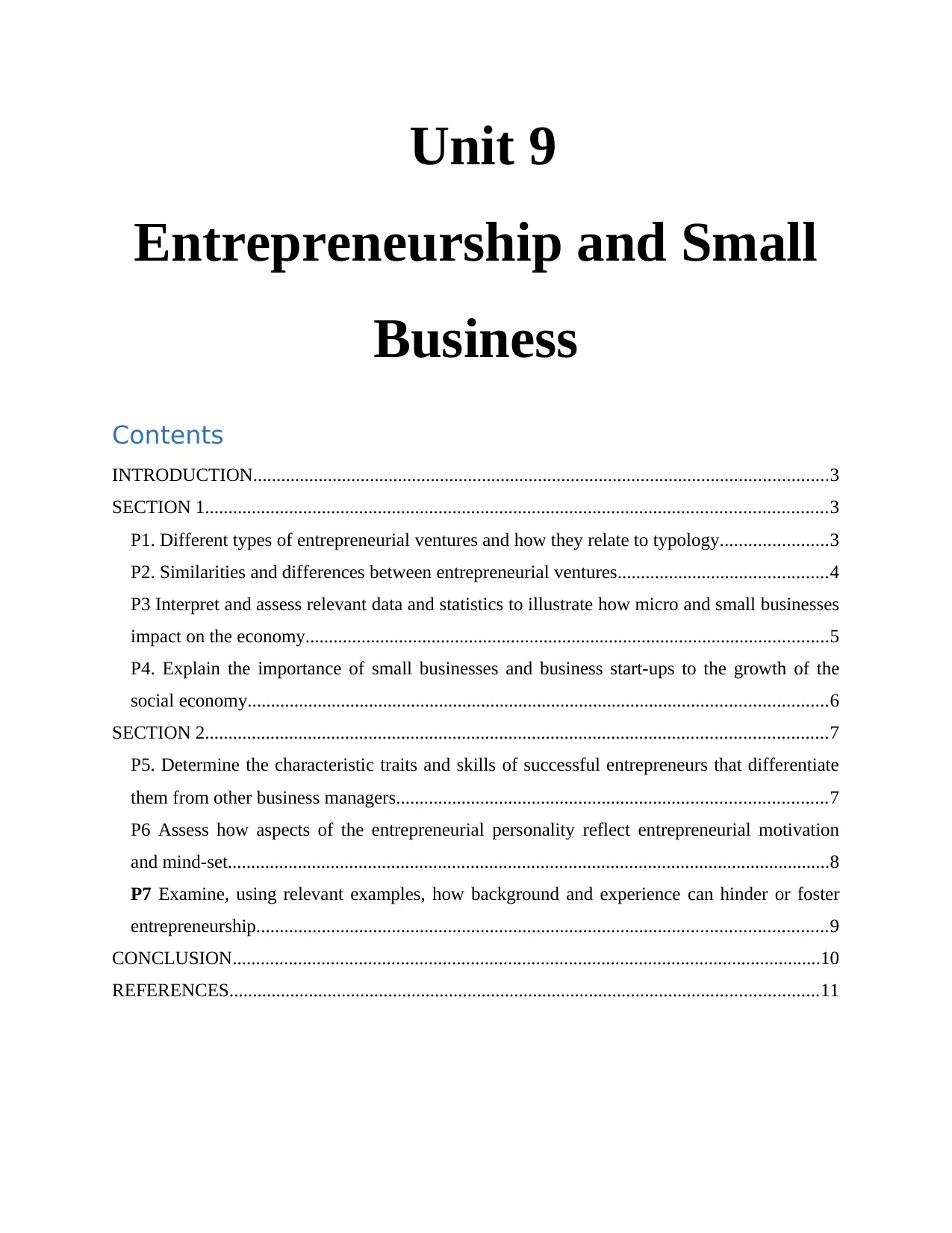
Unit 9
Entrepreneurship and Small
Business
Contents
INTRODUCTION...........................................................................................................................3
SECTION 1.....................................................................................................................................3
P1. Different types of entrepreneurial ventures and how they relate to typology.......................3
P2. Similarities and differences between entrepreneurial ventures.............................................4
P3 Interpret and assess relevant data and statistics to illustrate how micro and small businesses
impact on the economy................................................................................................................5
P4. Explain the importance of small businesses and business start-ups to the growth of the
social economy............................................................................................................................6
SECTION 2.....................................................................................................................................7
P5. Determine the characteristic traits and skills of successful entrepreneurs that differentiate
them from other business managers............................................................................................7
P6 Assess how aspects of the entrepreneurial personality reflect entrepreneurial motivation
and mind-set.................................................................................................................................8
P7 Examine, using relevant examples, how background and experience can hinder or foster
entrepreneurship..........................................................................................................................9
CONCLUSION..............................................................................................................................10
REFERENCES..............................................................................................................................11
Entrepreneurship and Small
Business
Contents
INTRODUCTION...........................................................................................................................3
SECTION 1.....................................................................................................................................3
P1. Different types of entrepreneurial ventures and how they relate to typology.......................3
P2. Similarities and differences between entrepreneurial ventures.............................................4
P3 Interpret and assess relevant data and statistics to illustrate how micro and small businesses
impact on the economy................................................................................................................5
P4. Explain the importance of small businesses and business start-ups to the growth of the
social economy............................................................................................................................6
SECTION 2.....................................................................................................................................7
P5. Determine the characteristic traits and skills of successful entrepreneurs that differentiate
them from other business managers............................................................................................7
P6 Assess how aspects of the entrepreneurial personality reflect entrepreneurial motivation
and mind-set.................................................................................................................................8
P7 Examine, using relevant examples, how background and experience can hinder or foster
entrepreneurship..........................................................................................................................9
CONCLUSION..............................................................................................................................10
REFERENCES..............................................................................................................................11
Secure Best Marks with AI Grader
Need help grading? Try our AI Grader for instant feedback on your assignments.
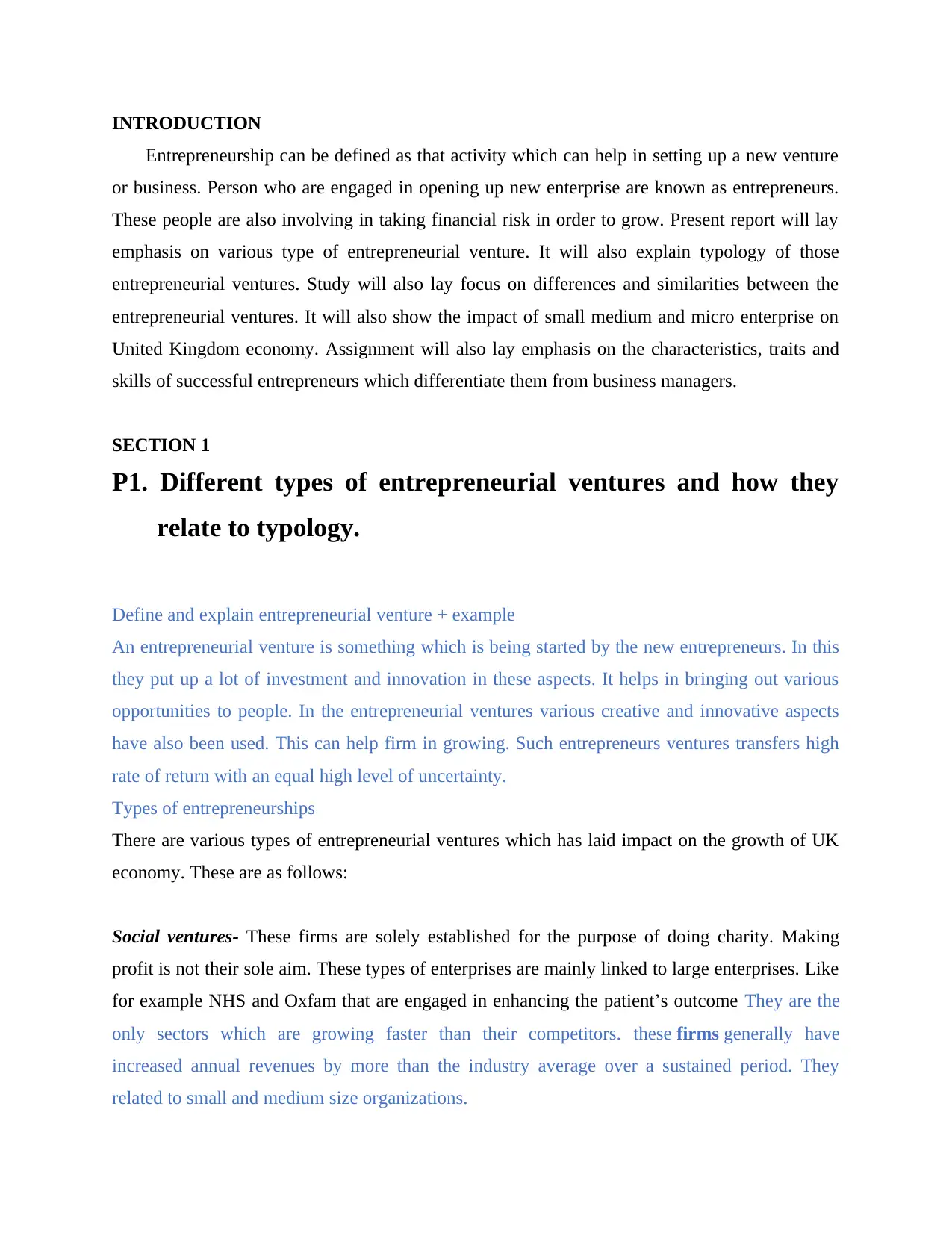
INTRODUCTION
Entrepreneurship can be defined as that activity which can help in setting up a new venture
or business. Person who are engaged in opening up new enterprise are known as entrepreneurs.
These people are also involving in taking financial risk in order to grow. Present report will lay
emphasis on various type of entrepreneurial venture. It will also explain typology of those
entrepreneurial ventures. Study will also lay focus on differences and similarities between the
entrepreneurial ventures. It will also show the impact of small medium and micro enterprise on
United Kingdom economy. Assignment will also lay emphasis on the characteristics, traits and
skills of successful entrepreneurs which differentiate them from business managers.
SECTION 1
P1. Different types of entrepreneurial ventures and how they
relate to typology.
Define and explain entrepreneurial venture + example
An entrepreneurial venture is something which is being started by the new entrepreneurs. In this
they put up a lot of investment and innovation in these aspects. It helps in bringing out various
opportunities to people. In the entrepreneurial ventures various creative and innovative aspects
have also been used. This can help firm in growing. Such entrepreneurs ventures transfers high
rate of return with an equal high level of uncertainty.
Types of entrepreneurships
There are various types of entrepreneurial ventures which has laid impact on the growth of UK
economy. These are as follows:
Social ventures- These firms are solely established for the purpose of doing charity. Making
profit is not their sole aim. These types of enterprises are mainly linked to large enterprises. Like
for example NHS and Oxfam that are engaged in enhancing the patient’s outcome They are the
only sectors which are growing faster than their competitors. these firms generally have
increased annual revenues by more than the industry average over a sustained period. They
related to small and medium size organizations.
Entrepreneurship can be defined as that activity which can help in setting up a new venture
or business. Person who are engaged in opening up new enterprise are known as entrepreneurs.
These people are also involving in taking financial risk in order to grow. Present report will lay
emphasis on various type of entrepreneurial venture. It will also explain typology of those
entrepreneurial ventures. Study will also lay focus on differences and similarities between the
entrepreneurial ventures. It will also show the impact of small medium and micro enterprise on
United Kingdom economy. Assignment will also lay emphasis on the characteristics, traits and
skills of successful entrepreneurs which differentiate them from business managers.
SECTION 1
P1. Different types of entrepreneurial ventures and how they
relate to typology.
Define and explain entrepreneurial venture + example
An entrepreneurial venture is something which is being started by the new entrepreneurs. In this
they put up a lot of investment and innovation in these aspects. It helps in bringing out various
opportunities to people. In the entrepreneurial ventures various creative and innovative aspects
have also been used. This can help firm in growing. Such entrepreneurs ventures transfers high
rate of return with an equal high level of uncertainty.
Types of entrepreneurships
There are various types of entrepreneurial ventures which has laid impact on the growth of UK
economy. These are as follows:
Social ventures- These firms are solely established for the purpose of doing charity. Making
profit is not their sole aim. These types of enterprises are mainly linked to large enterprises. Like
for example NHS and Oxfam that are engaged in enhancing the patient’s outcome They are the
only sectors which are growing faster than their competitors. these firms generally have
increased annual revenues by more than the industry average over a sustained period. They
related to small and medium size organizations.
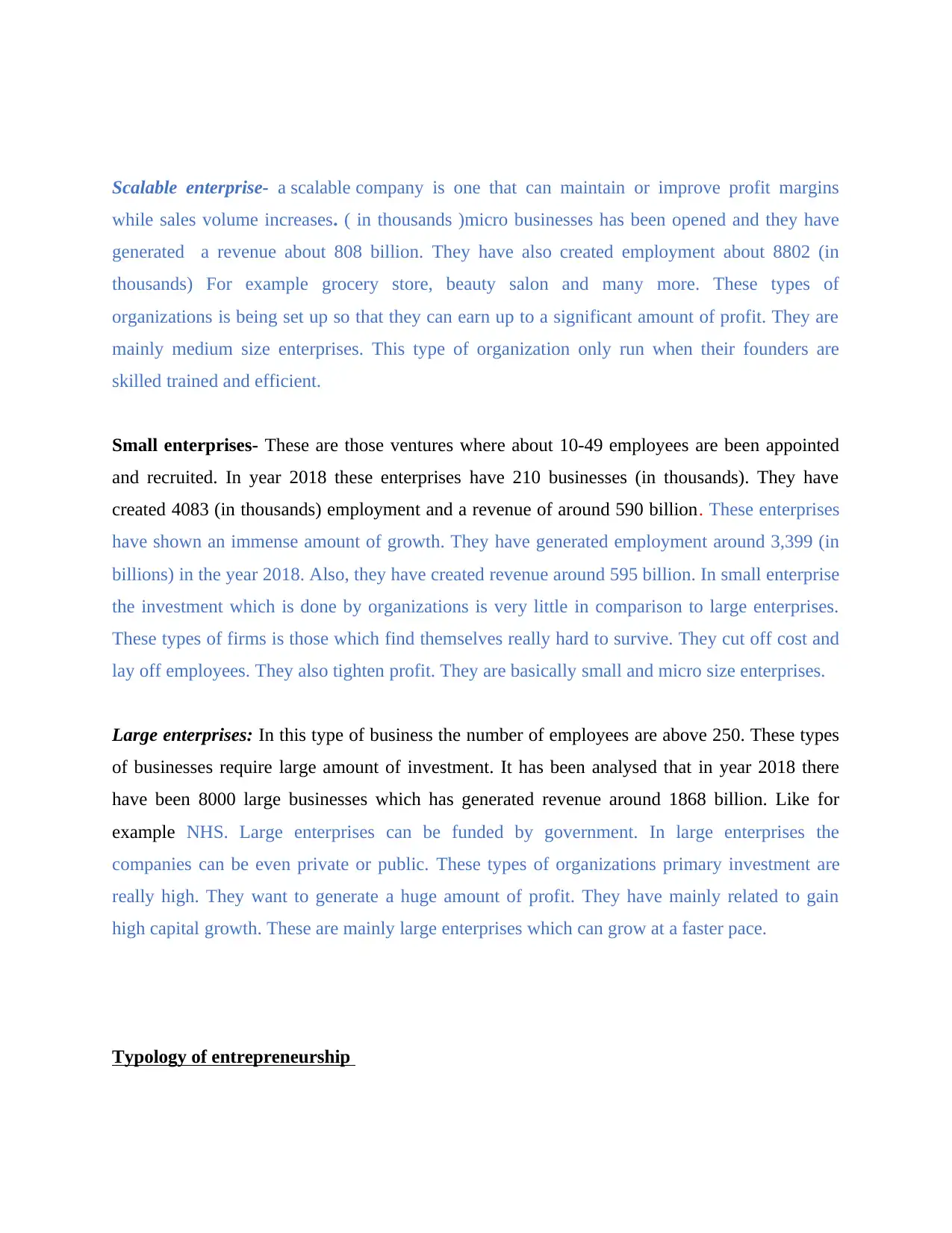
Scalable enterprise- a scalable company is one that can maintain or improve profit margins
while sales volume increases. ( in thousands )micro businesses has been opened and they have
generated a revenue about 808 billion. They have also created employment about 8802 (in
thousands) For example grocery store, beauty salon and many more. These types of
organizations is being set up so that they can earn up to a significant amount of profit. They are
mainly medium size enterprises. This type of organization only run when their founders are
skilled trained and efficient.
Small enterprises- These are those ventures where about 10-49 employees are been appointed
and recruited. In year 2018 these enterprises have 210 businesses (in thousands). They have
created 4083 (in thousands) employment and a revenue of around 590 billion. These enterprises
have shown an immense amount of growth. They have generated employment around 3,399 (in
billions) in the year 2018. Also, they have created revenue around 595 billion. In small enterprise
the investment which is done by organizations is very little in comparison to large enterprises.
These types of firms is those which find themselves really hard to survive. They cut off cost and
lay off employees. They also tighten profit. They are basically small and micro size enterprises.
Large enterprises: In this type of business the number of employees are above 250. These types
of businesses require large amount of investment. It has been analysed that in year 2018 there
have been 8000 large businesses which has generated revenue around 1868 billion. Like for
example NHS. Large enterprises can be funded by government. In large enterprises the
companies can be even private or public. These types of organizations primary investment are
really high. They want to generate a huge amount of profit. They have mainly related to gain
high capital growth. These are mainly large enterprises which can grow at a faster pace.
Typology of entrepreneurship
while sales volume increases. ( in thousands )micro businesses has been opened and they have
generated a revenue about 808 billion. They have also created employment about 8802 (in
thousands) For example grocery store, beauty salon and many more. These types of
organizations is being set up so that they can earn up to a significant amount of profit. They are
mainly medium size enterprises. This type of organization only run when their founders are
skilled trained and efficient.
Small enterprises- These are those ventures where about 10-49 employees are been appointed
and recruited. In year 2018 these enterprises have 210 businesses (in thousands). They have
created 4083 (in thousands) employment and a revenue of around 590 billion. These enterprises
have shown an immense amount of growth. They have generated employment around 3,399 (in
billions) in the year 2018. Also, they have created revenue around 595 billion. In small enterprise
the investment which is done by organizations is very little in comparison to large enterprises.
These types of firms is those which find themselves really hard to survive. They cut off cost and
lay off employees. They also tighten profit. They are basically small and micro size enterprises.
Large enterprises: In this type of business the number of employees are above 250. These types
of businesses require large amount of investment. It has been analysed that in year 2018 there
have been 8000 large businesses which has generated revenue around 1868 billion. Like for
example NHS. Large enterprises can be funded by government. In large enterprises the
companies can be even private or public. These types of organizations primary investment are
really high. They want to generate a huge amount of profit. They have mainly related to gain
high capital growth. These are mainly large enterprises which can grow at a faster pace.
Typology of entrepreneurship
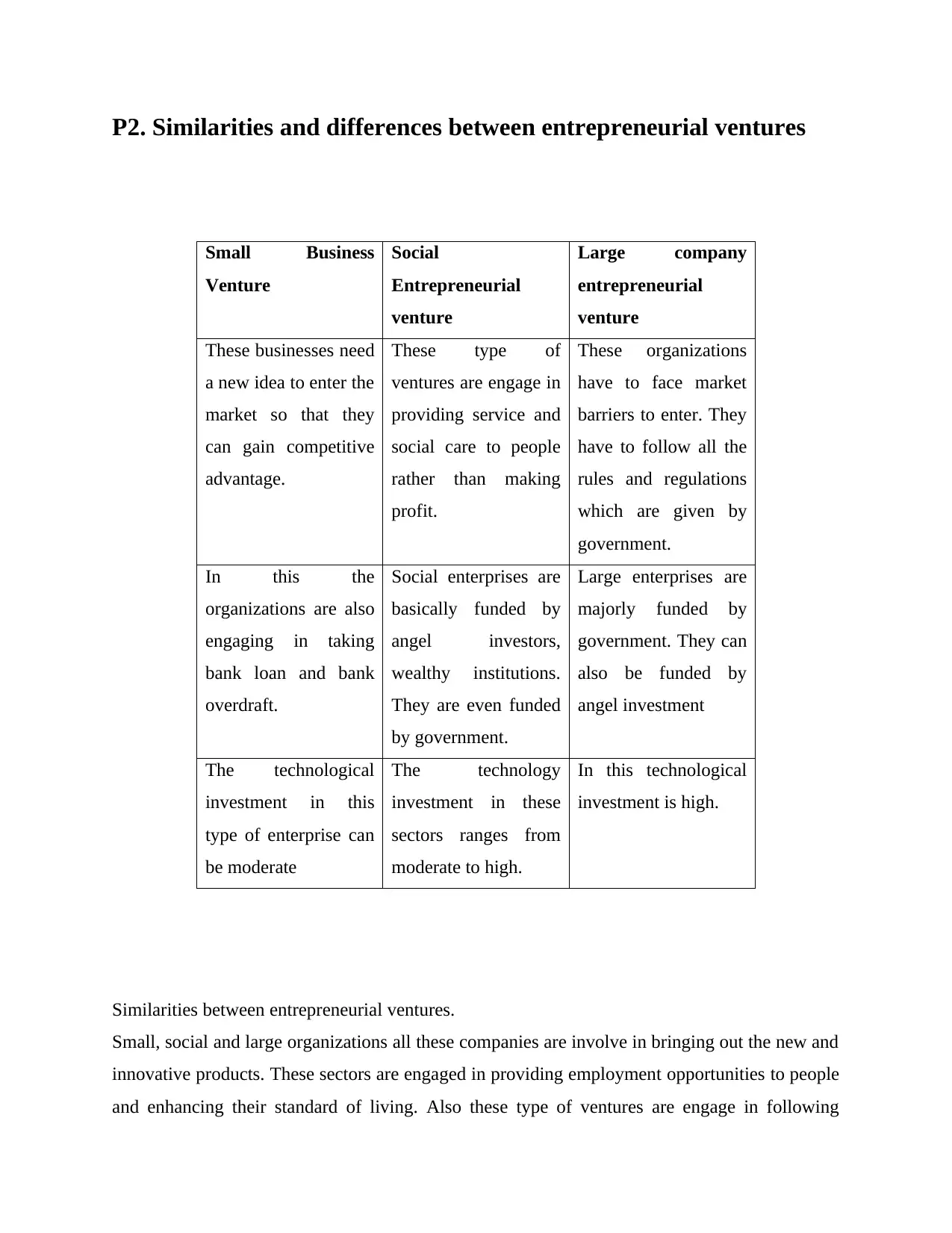
P2. Similarities and differences between entrepreneurial ventures
Small Business
Venture
Social
Entrepreneurial
venture
Large company
entrepreneurial
venture
These businesses need
a new idea to enter the
market so that they
can gain competitive
advantage.
These type of
ventures are engage in
providing service and
social care to people
rather than making
profit.
These organizations
have to face market
barriers to enter. They
have to follow all the
rules and regulations
which are given by
government.
In this the
organizations are also
engaging in taking
bank loan and bank
overdraft.
Social enterprises are
basically funded by
angel investors,
wealthy institutions.
They are even funded
by government.
Large enterprises are
majorly funded by
government. They can
also be funded by
angel investment
The technological
investment in this
type of enterprise can
be moderate
The technology
investment in these
sectors ranges from
moderate to high.
In this technological
investment is high.
Similarities between entrepreneurial ventures.
Small, social and large organizations all these companies are involve in bringing out the new and
innovative products. These sectors are engaged in providing employment opportunities to people
and enhancing their standard of living. Also these type of ventures are engage in following
Small Business
Venture
Social
Entrepreneurial
venture
Large company
entrepreneurial
venture
These businesses need
a new idea to enter the
market so that they
can gain competitive
advantage.
These type of
ventures are engage in
providing service and
social care to people
rather than making
profit.
These organizations
have to face market
barriers to enter. They
have to follow all the
rules and regulations
which are given by
government.
In this the
organizations are also
engaging in taking
bank loan and bank
overdraft.
Social enterprises are
basically funded by
angel investors,
wealthy institutions.
They are even funded
by government.
Large enterprises are
majorly funded by
government. They can
also be funded by
angel investment
The technological
investment in this
type of enterprise can
be moderate
The technology
investment in these
sectors ranges from
moderate to high.
In this technological
investment is high.
Similarities between entrepreneurial ventures.
Small, social and large organizations all these companies are involve in bringing out the new and
innovative products. These sectors are engaged in providing employment opportunities to people
and enhancing their standard of living. Also these type of ventures are engage in following
Secure Best Marks with AI Grader
Need help grading? Try our AI Grader for instant feedback on your assignments.
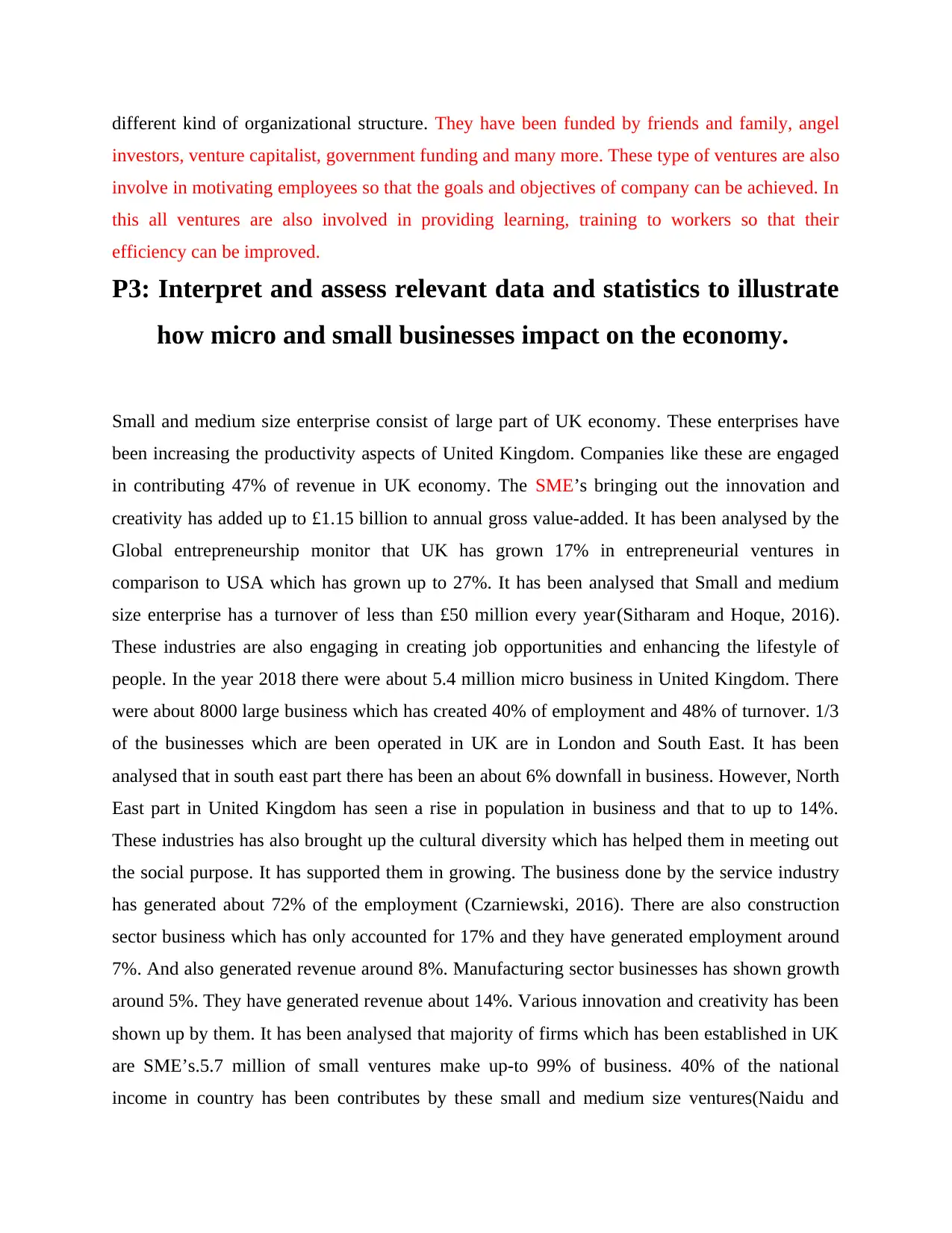
different kind of organizational structure. They have been funded by friends and family, angel
investors, venture capitalist, government funding and many more. These type of ventures are also
involve in motivating employees so that the goals and objectives of company can be achieved. In
this all ventures are also involved in providing learning, training to workers so that their
efficiency can be improved.
P3: Interpret and assess relevant data and statistics to illustrate
how micro and small businesses impact on the economy.
Small and medium size enterprise consist of large part of UK economy. These enterprises have
been increasing the productivity aspects of United Kingdom. Companies like these are engaged
in contributing 47% of revenue in UK economy. The SME’s bringing out the innovation and
creativity has added up to £1.15 billion to annual gross value-added. It has been analysed by the
Global entrepreneurship monitor that UK has grown 17% in entrepreneurial ventures in
comparison to USA which has grown up to 27%. It has been analysed that Small and medium
size enterprise has a turnover of less than £50 million every year(Sitharam and Hoque, 2016).
These industries are also engaging in creating job opportunities and enhancing the lifestyle of
people. In the year 2018 there were about 5.4 million micro business in United Kingdom. There
were about 8000 large business which has created 40% of employment and 48% of turnover. 1/3
of the businesses which are been operated in UK are in London and South East. It has been
analysed that in south east part there has been an about 6% downfall in business. However, North
East part in United Kingdom has seen a rise in population in business and that to up to 14%.
These industries has also brought up the cultural diversity which has helped them in meeting out
the social purpose. It has supported them in growing. The business done by the service industry
has generated about 72% of the employment (Czarniewski, 2016). There are also construction
sector business which has only accounted for 17% and they have generated employment around
7%. And also generated revenue around 8%. Manufacturing sector businesses has shown growth
around 5%. They have generated revenue about 14%. Various innovation and creativity has been
shown up by them. It has been analysed that majority of firms which has been established in UK
are SME’s.5.7 million of small ventures make up-to 99% of business. 40% of the national
income in country has been contributes by these small and medium size ventures(Naidu and
investors, venture capitalist, government funding and many more. These type of ventures are also
involve in motivating employees so that the goals and objectives of company can be achieved. In
this all ventures are also involved in providing learning, training to workers so that their
efficiency can be improved.
P3: Interpret and assess relevant data and statistics to illustrate
how micro and small businesses impact on the economy.
Small and medium size enterprise consist of large part of UK economy. These enterprises have
been increasing the productivity aspects of United Kingdom. Companies like these are engaged
in contributing 47% of revenue in UK economy. The SME’s bringing out the innovation and
creativity has added up to £1.15 billion to annual gross value-added. It has been analysed by the
Global entrepreneurship monitor that UK has grown 17% in entrepreneurial ventures in
comparison to USA which has grown up to 27%. It has been analysed that Small and medium
size enterprise has a turnover of less than £50 million every year(Sitharam and Hoque, 2016).
These industries are also engaging in creating job opportunities and enhancing the lifestyle of
people. In the year 2018 there were about 5.4 million micro business in United Kingdom. There
were about 8000 large business which has created 40% of employment and 48% of turnover. 1/3
of the businesses which are been operated in UK are in London and South East. It has been
analysed that in south east part there has been an about 6% downfall in business. However, North
East part in United Kingdom has seen a rise in population in business and that to up to 14%.
These industries has also brought up the cultural diversity which has helped them in meeting out
the social purpose. It has supported them in growing. The business done by the service industry
has generated about 72% of the employment (Czarniewski, 2016). There are also construction
sector business which has only accounted for 17% and they have generated employment around
7%. And also generated revenue around 8%. Manufacturing sector businesses has shown growth
around 5%. They have generated revenue about 14%. Various innovation and creativity has been
shown up by them. It has been analysed that majority of firms which has been established in UK
are SME’s.5.7 million of small ventures make up-to 99% of business. 40% of the national
income in country has been contributes by these small and medium size ventures(Naidu and
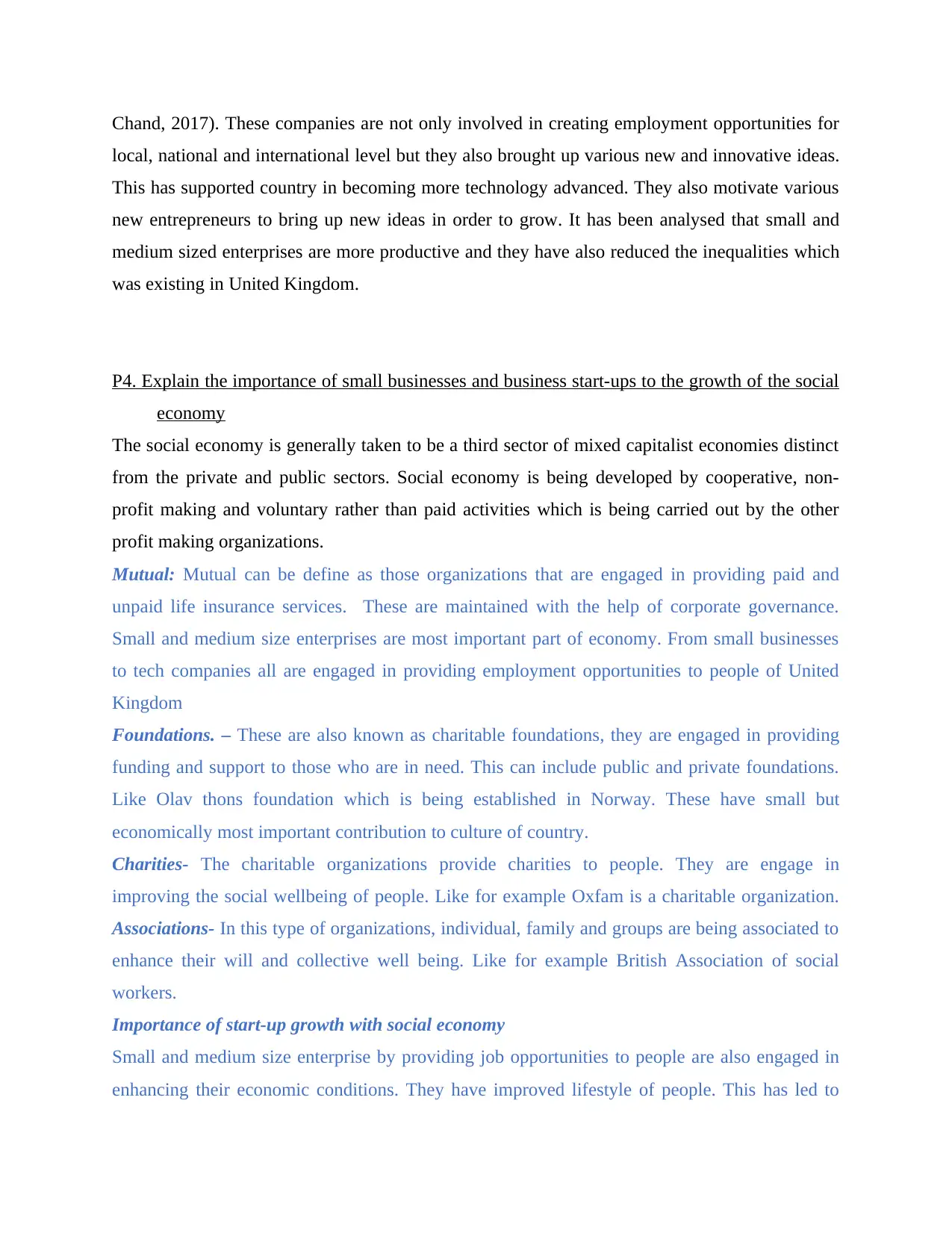
Chand, 2017). These companies are not only involved in creating employment opportunities for
local, national and international level but they also brought up various new and innovative ideas.
This has supported country in becoming more technology advanced. They also motivate various
new entrepreneurs to bring up new ideas in order to grow. It has been analysed that small and
medium sized enterprises are more productive and they have also reduced the inequalities which
was existing in United Kingdom.
P4. Explain the importance of small businesses and business start-ups to the growth of the social
economy
The social economy is generally taken to be a third sector of mixed capitalist economies distinct
from the private and public sectors. Social economy is being developed by cooperative, non-
profit making and voluntary rather than paid activities which is being carried out by the other
profit making organizations.
Mutual: Mutual can be define as those organizations that are engaged in providing paid and
unpaid life insurance services. These are maintained with the help of corporate governance.
Small and medium size enterprises are most important part of economy. From small businesses
to tech companies all are engaged in providing employment opportunities to people of United
Kingdom
Foundations. – These are also known as charitable foundations, they are engaged in providing
funding and support to those who are in need. This can include public and private foundations.
Like Olav thons foundation which is being established in Norway. These have small but
economically most important contribution to culture of country.
Charities- The charitable organizations provide charities to people. They are engage in
improving the social wellbeing of people. Like for example Oxfam is a charitable organization.
Associations- In this type of organizations, individual, family and groups are being associated to
enhance their will and collective well being. Like for example British Association of social
workers.
Importance of start-up growth with social economy
Small and medium size enterprise by providing job opportunities to people are also engaged in
enhancing their economic conditions. They have improved lifestyle of people. This has led to
local, national and international level but they also brought up various new and innovative ideas.
This has supported country in becoming more technology advanced. They also motivate various
new entrepreneurs to bring up new ideas in order to grow. It has been analysed that small and
medium sized enterprises are more productive and they have also reduced the inequalities which
was existing in United Kingdom.
P4. Explain the importance of small businesses and business start-ups to the growth of the social
economy
The social economy is generally taken to be a third sector of mixed capitalist economies distinct
from the private and public sectors. Social economy is being developed by cooperative, non-
profit making and voluntary rather than paid activities which is being carried out by the other
profit making organizations.
Mutual: Mutual can be define as those organizations that are engaged in providing paid and
unpaid life insurance services. These are maintained with the help of corporate governance.
Small and medium size enterprises are most important part of economy. From small businesses
to tech companies all are engaged in providing employment opportunities to people of United
Kingdom
Foundations. – These are also known as charitable foundations, they are engaged in providing
funding and support to those who are in need. This can include public and private foundations.
Like Olav thons foundation which is being established in Norway. These have small but
economically most important contribution to culture of country.
Charities- The charitable organizations provide charities to people. They are engage in
improving the social wellbeing of people. Like for example Oxfam is a charitable organization.
Associations- In this type of organizations, individual, family and groups are being associated to
enhance their will and collective well being. Like for example British Association of social
workers.
Importance of start-up growth with social economy
Small and medium size enterprise by providing job opportunities to people are also engaged in
enhancing their economic conditions. They have improved lifestyle of people. This has led to
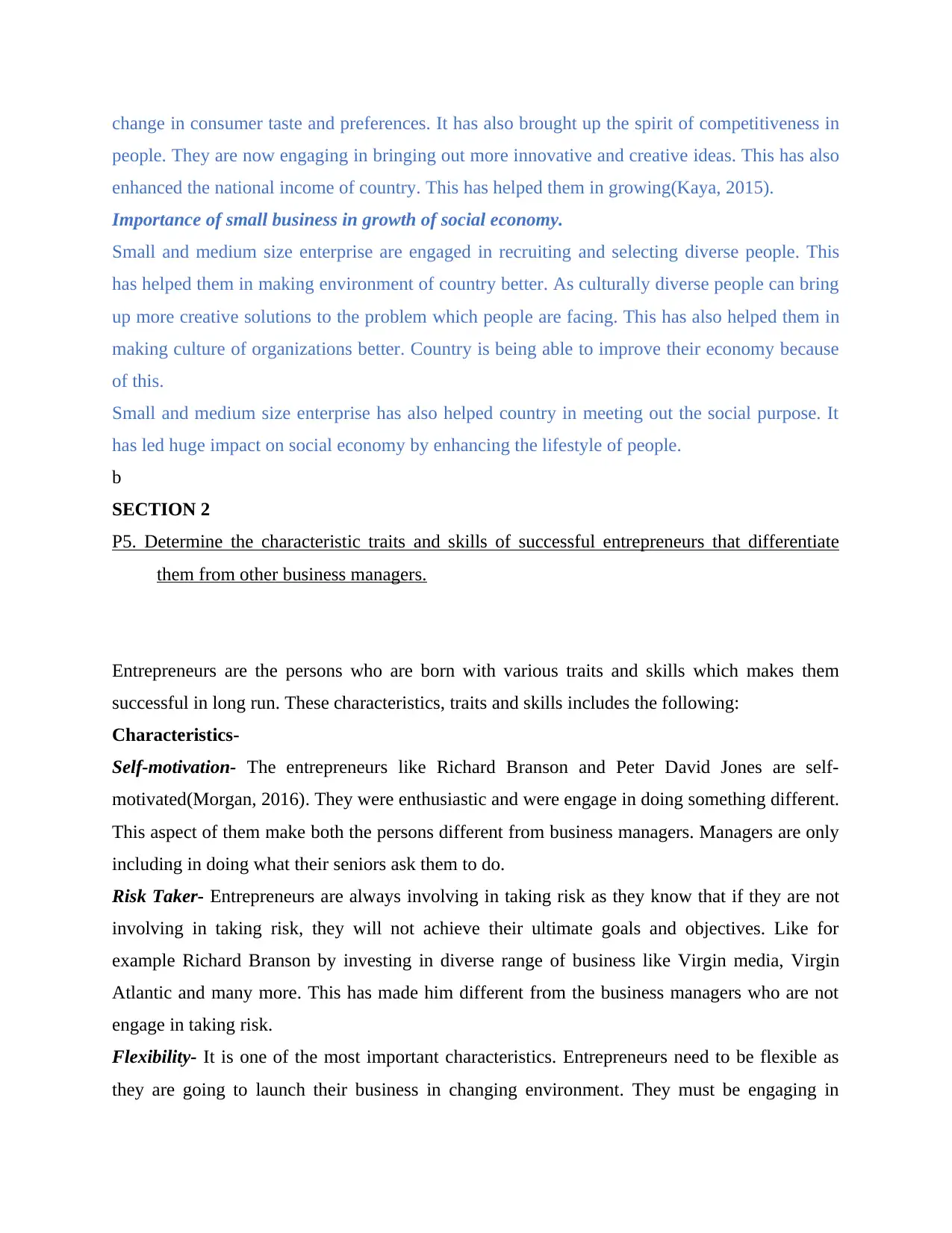
change in consumer taste and preferences. It has also brought up the spirit of competitiveness in
people. They are now engaging in bringing out more innovative and creative ideas. This has also
enhanced the national income of country. This has helped them in growing(Kaya, 2015).
Importance of small business in growth of social economy.
Small and medium size enterprise are engaged in recruiting and selecting diverse people. This
has helped them in making environment of country better. As culturally diverse people can bring
up more creative solutions to the problem which people are facing. This has also helped them in
making culture of organizations better. Country is being able to improve their economy because
of this.
Small and medium size enterprise has also helped country in meeting out the social purpose. It
has led huge impact on social economy by enhancing the lifestyle of people.
b
SECTION 2
P5. Determine the characteristic traits and skills of successful entrepreneurs that differentiate
them from other business managers.
Entrepreneurs are the persons who are born with various traits and skills which makes them
successful in long run. These characteristics, traits and skills includes the following:
Characteristics-
Self-motivation- The entrepreneurs like Richard Branson and Peter David Jones are self-
motivated(Morgan, 2016). They were enthusiastic and were engage in doing something different.
This aspect of them make both the persons different from business managers. Managers are only
including in doing what their seniors ask them to do.
Risk Taker- Entrepreneurs are always involving in taking risk as they know that if they are not
involving in taking risk, they will not achieve their ultimate goals and objectives. Like for
example Richard Branson by investing in diverse range of business like Virgin media, Virgin
Atlantic and many more. This has made him different from the business managers who are not
engage in taking risk.
Flexibility- It is one of the most important characteristics. Entrepreneurs need to be flexible as
they are going to launch their business in changing environment. They must be engaging in
people. They are now engaging in bringing out more innovative and creative ideas. This has also
enhanced the national income of country. This has helped them in growing(Kaya, 2015).
Importance of small business in growth of social economy.
Small and medium size enterprise are engaged in recruiting and selecting diverse people. This
has helped them in making environment of country better. As culturally diverse people can bring
up more creative solutions to the problem which people are facing. This has also helped them in
making culture of organizations better. Country is being able to improve their economy because
of this.
Small and medium size enterprise has also helped country in meeting out the social purpose. It
has led huge impact on social economy by enhancing the lifestyle of people.
b
SECTION 2
P5. Determine the characteristic traits and skills of successful entrepreneurs that differentiate
them from other business managers.
Entrepreneurs are the persons who are born with various traits and skills which makes them
successful in long run. These characteristics, traits and skills includes the following:
Characteristics-
Self-motivation- The entrepreneurs like Richard Branson and Peter David Jones are self-
motivated(Morgan, 2016). They were enthusiastic and were engage in doing something different.
This aspect of them make both the persons different from business managers. Managers are only
including in doing what their seniors ask them to do.
Risk Taker- Entrepreneurs are always involving in taking risk as they know that if they are not
involving in taking risk, they will not achieve their ultimate goals and objectives. Like for
example Richard Branson by investing in diverse range of business like Virgin media, Virgin
Atlantic and many more. This has made him different from the business managers who are not
engage in taking risk.
Flexibility- It is one of the most important characteristics. Entrepreneurs need to be flexible as
they are going to launch their business in changing environment. They must be engaging in
Paraphrase This Document
Need a fresh take? Get an instant paraphrase of this document with our AI Paraphraser
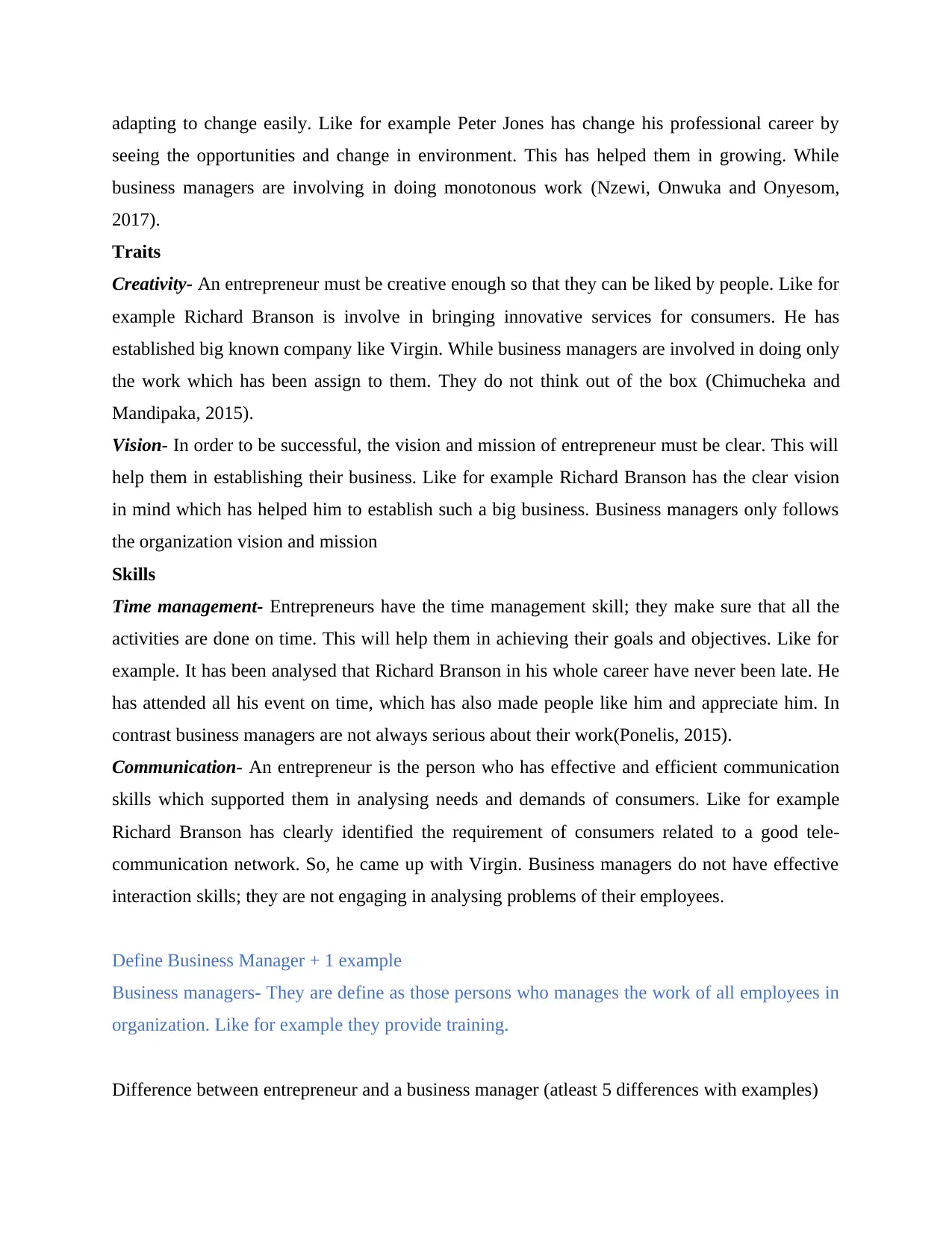
adapting to change easily. Like for example Peter Jones has change his professional career by
seeing the opportunities and change in environment. This has helped them in growing. While
business managers are involving in doing monotonous work (Nzewi, Onwuka and Onyesom,
2017).
Traits
Creativity- An entrepreneur must be creative enough so that they can be liked by people. Like for
example Richard Branson is involve in bringing innovative services for consumers. He has
established big known company like Virgin. While business managers are involved in doing only
the work which has been assign to them. They do not think out of the box (Chimucheka and
Mandipaka, 2015).
Vision- In order to be successful, the vision and mission of entrepreneur must be clear. This will
help them in establishing their business. Like for example Richard Branson has the clear vision
in mind which has helped him to establish such a big business. Business managers only follows
the organization vision and mission
Skills
Time management- Entrepreneurs have the time management skill; they make sure that all the
activities are done on time. This will help them in achieving their goals and objectives. Like for
example. It has been analysed that Richard Branson in his whole career have never been late. He
has attended all his event on time, which has also made people like him and appreciate him. In
contrast business managers are not always serious about their work(Ponelis, 2015).
Communication- An entrepreneur is the person who has effective and efficient communication
skills which supported them in analysing needs and demands of consumers. Like for example
Richard Branson has clearly identified the requirement of consumers related to a good tele-
communication network. So, he came up with Virgin. Business managers do not have effective
interaction skills; they are not engaging in analysing problems of their employees.
Define Business Manager + 1 example
Business managers- They are define as those persons who manages the work of all employees in
organization. Like for example they provide training.
Difference between entrepreneur and a business manager (atleast 5 differences with examples)
seeing the opportunities and change in environment. This has helped them in growing. While
business managers are involving in doing monotonous work (Nzewi, Onwuka and Onyesom,
2017).
Traits
Creativity- An entrepreneur must be creative enough so that they can be liked by people. Like for
example Richard Branson is involve in bringing innovative services for consumers. He has
established big known company like Virgin. While business managers are involved in doing only
the work which has been assign to them. They do not think out of the box (Chimucheka and
Mandipaka, 2015).
Vision- In order to be successful, the vision and mission of entrepreneur must be clear. This will
help them in establishing their business. Like for example Richard Branson has the clear vision
in mind which has helped him to establish such a big business. Business managers only follows
the organization vision and mission
Skills
Time management- Entrepreneurs have the time management skill; they make sure that all the
activities are done on time. This will help them in achieving their goals and objectives. Like for
example. It has been analysed that Richard Branson in his whole career have never been late. He
has attended all his event on time, which has also made people like him and appreciate him. In
contrast business managers are not always serious about their work(Ponelis, 2015).
Communication- An entrepreneur is the person who has effective and efficient communication
skills which supported them in analysing needs and demands of consumers. Like for example
Richard Branson has clearly identified the requirement of consumers related to a good tele-
communication network. So, he came up with Virgin. Business managers do not have effective
interaction skills; they are not engaging in analysing problems of their employees.
Define Business Manager + 1 example
Business managers- They are define as those persons who manages the work of all employees in
organization. Like for example they provide training.
Difference between entrepreneur and a business manager (atleast 5 differences with examples)
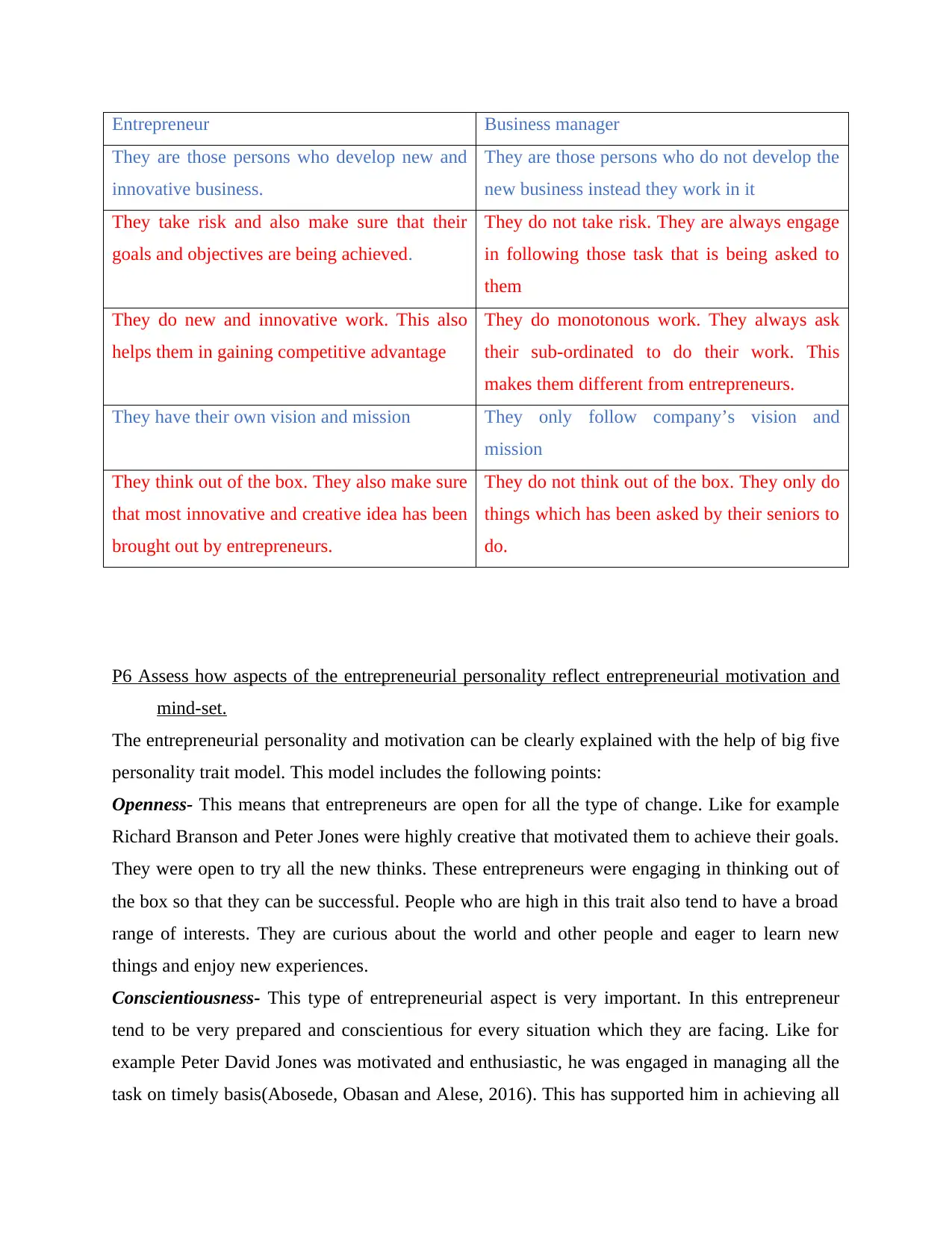
Entrepreneur Business manager
They are those persons who develop new and
innovative business.
They are those persons who do not develop the
new business instead they work in it
They take risk and also make sure that their
goals and objectives are being achieved.
They do not take risk. They are always engage
in following those task that is being asked to
them
They do new and innovative work. This also
helps them in gaining competitive advantage
They do monotonous work. They always ask
their sub-ordinated to do their work. This
makes them different from entrepreneurs.
They have their own vision and mission They only follow company’s vision and
mission
They think out of the box. They also make sure
that most innovative and creative idea has been
brought out by entrepreneurs.
They do not think out of the box. They only do
things which has been asked by their seniors to
do.
P6 Assess how aspects of the entrepreneurial personality reflect entrepreneurial motivation and
mind-set.
The entrepreneurial personality and motivation can be clearly explained with the help of big five
personality trait model. This model includes the following points:
Openness- This means that entrepreneurs are open for all the type of change. Like for example
Richard Branson and Peter Jones were highly creative that motivated them to achieve their goals.
They were open to try all the new thinks. These entrepreneurs were engaging in thinking out of
the box so that they can be successful. People who are high in this trait also tend to have a broad
range of interests. They are curious about the world and other people and eager to learn new
things and enjoy new experiences.
Conscientiousness- This type of entrepreneurial aspect is very important. In this entrepreneur
tend to be very prepared and conscientious for every situation which they are facing. Like for
example Peter David Jones was motivated and enthusiastic, he was engaged in managing all the
task on timely basis(Abosede, Obasan and Alese, 2016). This has supported him in achieving all
They are those persons who develop new and
innovative business.
They are those persons who do not develop the
new business instead they work in it
They take risk and also make sure that their
goals and objectives are being achieved.
They do not take risk. They are always engage
in following those task that is being asked to
them
They do new and innovative work. This also
helps them in gaining competitive advantage
They do monotonous work. They always ask
their sub-ordinated to do their work. This
makes them different from entrepreneurs.
They have their own vision and mission They only follow company’s vision and
mission
They think out of the box. They also make sure
that most innovative and creative idea has been
brought out by entrepreneurs.
They do not think out of the box. They only do
things which has been asked by their seniors to
do.
P6 Assess how aspects of the entrepreneurial personality reflect entrepreneurial motivation and
mind-set.
The entrepreneurial personality and motivation can be clearly explained with the help of big five
personality trait model. This model includes the following points:
Openness- This means that entrepreneurs are open for all the type of change. Like for example
Richard Branson and Peter Jones were highly creative that motivated them to achieve their goals.
They were open to try all the new thinks. These entrepreneurs were engaging in thinking out of
the box so that they can be successful. People who are high in this trait also tend to have a broad
range of interests. They are curious about the world and other people and eager to learn new
things and enjoy new experiences.
Conscientiousness- This type of entrepreneurial aspect is very important. In this entrepreneur
tend to be very prepared and conscientious for every situation which they are facing. Like for
example Peter David Jones was motivated and enthusiastic, he was engaged in managing all the
task on timely basis(Abosede, Obasan and Alese, 2016). This has supported him in achieving all
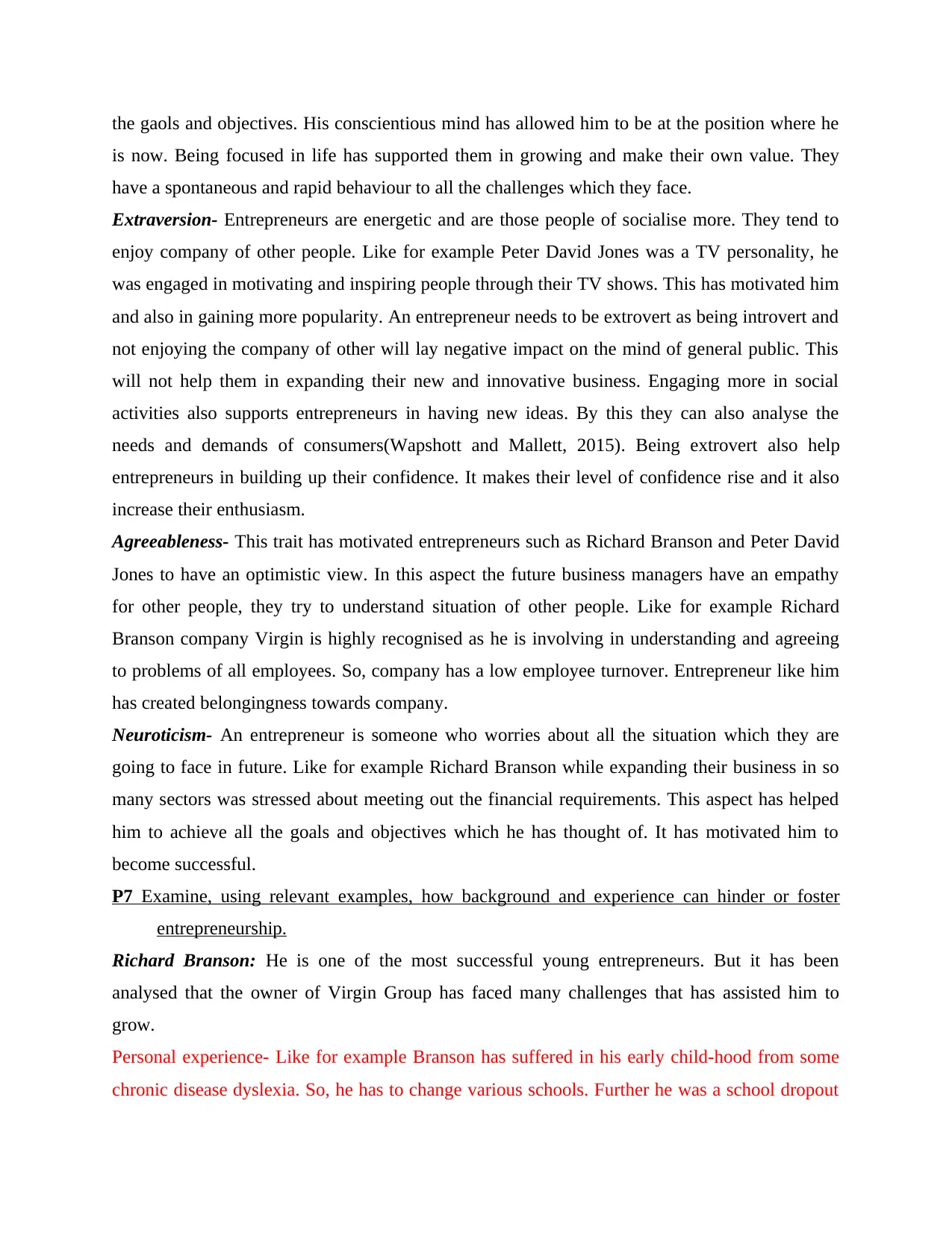
the gaols and objectives. His conscientious mind has allowed him to be at the position where he
is now. Being focused in life has supported them in growing and make their own value. They
have a spontaneous and rapid behaviour to all the challenges which they face.
Extraversion- Entrepreneurs are energetic and are those people of socialise more. They tend to
enjoy company of other people. Like for example Peter David Jones was a TV personality, he
was engaged in motivating and inspiring people through their TV shows. This has motivated him
and also in gaining more popularity. An entrepreneur needs to be extrovert as being introvert and
not enjoying the company of other will lay negative impact on the mind of general public. This
will not help them in expanding their new and innovative business. Engaging more in social
activities also supports entrepreneurs in having new ideas. By this they can also analyse the
needs and demands of consumers(Wapshott and Mallett, 2015). Being extrovert also help
entrepreneurs in building up their confidence. It makes their level of confidence rise and it also
increase their enthusiasm.
Agreeableness- This trait has motivated entrepreneurs such as Richard Branson and Peter David
Jones to have an optimistic view. In this aspect the future business managers have an empathy
for other people, they try to understand situation of other people. Like for example Richard
Branson company Virgin is highly recognised as he is involving in understanding and agreeing
to problems of all employees. So, company has a low employee turnover. Entrepreneur like him
has created belongingness towards company.
Neuroticism- An entrepreneur is someone who worries about all the situation which they are
going to face in future. Like for example Richard Branson while expanding their business in so
many sectors was stressed about meeting out the financial requirements. This aspect has helped
him to achieve all the goals and objectives which he has thought of. It has motivated him to
become successful.
P7 Examine, using relevant examples, how background and experience can hinder or foster
entrepreneurship.
Richard Branson: He is one of the most successful young entrepreneurs. But it has been
analysed that the owner of Virgin Group has faced many challenges that has assisted him to
grow.
Personal experience- Like for example Branson has suffered in his early child-hood from some
chronic disease dyslexia. So, he has to change various schools. Further he was a school dropout
is now. Being focused in life has supported them in growing and make their own value. They
have a spontaneous and rapid behaviour to all the challenges which they face.
Extraversion- Entrepreneurs are energetic and are those people of socialise more. They tend to
enjoy company of other people. Like for example Peter David Jones was a TV personality, he
was engaged in motivating and inspiring people through their TV shows. This has motivated him
and also in gaining more popularity. An entrepreneur needs to be extrovert as being introvert and
not enjoying the company of other will lay negative impact on the mind of general public. This
will not help them in expanding their new and innovative business. Engaging more in social
activities also supports entrepreneurs in having new ideas. By this they can also analyse the
needs and demands of consumers(Wapshott and Mallett, 2015). Being extrovert also help
entrepreneurs in building up their confidence. It makes their level of confidence rise and it also
increase their enthusiasm.
Agreeableness- This trait has motivated entrepreneurs such as Richard Branson and Peter David
Jones to have an optimistic view. In this aspect the future business managers have an empathy
for other people, they try to understand situation of other people. Like for example Richard
Branson company Virgin is highly recognised as he is involving in understanding and agreeing
to problems of all employees. So, company has a low employee turnover. Entrepreneur like him
has created belongingness towards company.
Neuroticism- An entrepreneur is someone who worries about all the situation which they are
going to face in future. Like for example Richard Branson while expanding their business in so
many sectors was stressed about meeting out the financial requirements. This aspect has helped
him to achieve all the goals and objectives which he has thought of. It has motivated him to
become successful.
P7 Examine, using relevant examples, how background and experience can hinder or foster
entrepreneurship.
Richard Branson: He is one of the most successful young entrepreneurs. But it has been
analysed that the owner of Virgin Group has faced many challenges that has assisted him to
grow.
Personal experience- Like for example Branson has suffered in his early child-hood from some
chronic disease dyslexia. So, he has to change various schools. Further he was a school dropout
Secure Best Marks with AI Grader
Need help grading? Try our AI Grader for instant feedback on your assignments.

at the age of 16. After this the entrepreneur was engaged in starting a youth culture magazine
which was known as Student. He was hardworking and has set his objectives in early childhood
only. (Jabeen, Faisal and Al Matroushi, 2019) This factor has motivated the entrepreneur like
Richard Branson to perform better. The first 50,000 copies of the magazine started by him was
sold for free.
Family background- Richard Charles Nicholas Branson was born on July 18, 1950, in Surrey,
England. His father, Edward James Branson, worked as a barrister. His mother, Eve Branson,
was employed as a flight attendant. It has been analysed that his father do not supported his
business ideas and he was also a school dropout. After that in the year 1969 Richard Branson got
the idea to start a mail order company in support of his magazine. The company was known as
Virgin Company become successful because of the adjusting attitude of entrepreneur. After this
Richard Branson also thought of expanding their business as in the year 1984, he started Virgin
Atlantic Airline but in the year 1992 the firm was struggling from financial support. After all this
also Richard Branson didn’t lost hope, he put down his effort and was successful.
Peter David Jones: Peter Jones is one of the most successful British Entrepreneur. He became
entrepreneur at just the age of 16. He owned Tennis Academy at that age. The traits which
motivated him was the attitude of never giving up.
Personal experience- He was also engaging in setting up the computer classes along with tennis
academy. He says that he thought of song business at a very young age. Peter Jones said that it
was his friend who motivated him to be successful and an entrepreneur. It was being analysed
that entrepreneur was flexible and was also open for changes which has supported him in
growing. He said that because of self-belief and commitment, he was able to make his business
successful. There were various challenges in his path, but he overcome all the hurdles without
any hesitation. He has started making investment in various other ventures in year 2004-2008. It
was also analysed that Peter David Jones made various property investment in year 2008.
Family background- Peter Jones has three children that is Natalia, Isabella and Tallulah. He has
been separated from his first wife that is Caroline. It was being interpreted that computer
business which he opened in early childhood was not very successful. After this failure, he
thought of having an innovative and creative business idea in order to grow.
which was known as Student. He was hardworking and has set his objectives in early childhood
only. (Jabeen, Faisal and Al Matroushi, 2019) This factor has motivated the entrepreneur like
Richard Branson to perform better. The first 50,000 copies of the magazine started by him was
sold for free.
Family background- Richard Charles Nicholas Branson was born on July 18, 1950, in Surrey,
England. His father, Edward James Branson, worked as a barrister. His mother, Eve Branson,
was employed as a flight attendant. It has been analysed that his father do not supported his
business ideas and he was also a school dropout. After that in the year 1969 Richard Branson got
the idea to start a mail order company in support of his magazine. The company was known as
Virgin Company become successful because of the adjusting attitude of entrepreneur. After this
Richard Branson also thought of expanding their business as in the year 1984, he started Virgin
Atlantic Airline but in the year 1992 the firm was struggling from financial support. After all this
also Richard Branson didn’t lost hope, he put down his effort and was successful.
Peter David Jones: Peter Jones is one of the most successful British Entrepreneur. He became
entrepreneur at just the age of 16. He owned Tennis Academy at that age. The traits which
motivated him was the attitude of never giving up.
Personal experience- He was also engaging in setting up the computer classes along with tennis
academy. He says that he thought of song business at a very young age. Peter Jones said that it
was his friend who motivated him to be successful and an entrepreneur. It was being analysed
that entrepreneur was flexible and was also open for changes which has supported him in
growing. He said that because of self-belief and commitment, he was able to make his business
successful. There were various challenges in his path, but he overcome all the hurdles without
any hesitation. He has started making investment in various other ventures in year 2004-2008. It
was also analysed that Peter David Jones made various property investment in year 2008.
Family background- Peter Jones has three children that is Natalia, Isabella and Tallulah. He has
been separated from his first wife that is Caroline. It was being interpreted that computer
business which he opened in early childhood was not very successful. After this failure, he
thought of having an innovative and creative business idea in order to grow.

CONCLUSION
From the above study it has been summarised that small and medium size enterprise has
helped to enhance the economy of country. It has provided various job opportunities to people. It
has also helped them in improving the living style of people. This has helped country in
increasing their gross domestic income. Various entrepreneurs like Richard Branson and Peter
Jones have set an example that how having ac clear mission and vision has supported them in
becoming successful. They have different skills like time management and decision making that
has assisted them in growing. It has also made them different from business managers.
From the above study it has been summarised that small and medium size enterprise has
helped to enhance the economy of country. It has provided various job opportunities to people. It
has also helped them in improving the living style of people. This has helped country in
increasing their gross domestic income. Various entrepreneurs like Richard Branson and Peter
Jones have set an example that how having ac clear mission and vision has supported them in
becoming successful. They have different skills like time management and decision making that
has assisted them in growing. It has also made them different from business managers.
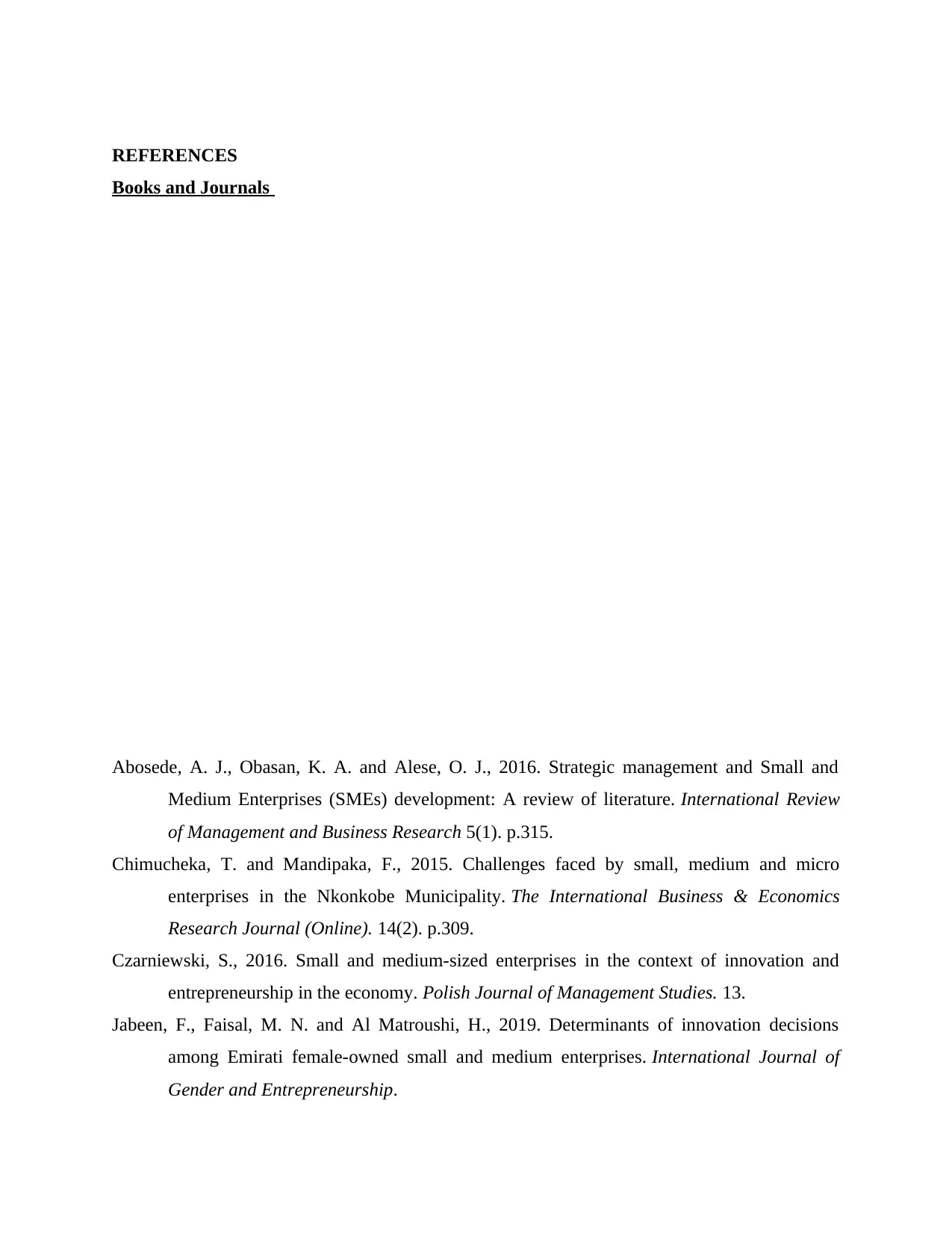
REFERENCES
Books and Journals
Abosede, A. J., Obasan, K. A. and Alese, O. J., 2016. Strategic management and Small and
Medium Enterprises (SMEs) development: A review of literature. International Review
of Management and Business Research 5(1). p.315.
Chimucheka, T. and Mandipaka, F., 2015. Challenges faced by small, medium and micro
enterprises in the Nkonkobe Municipality. The International Business & Economics
Research Journal (Online). 14(2). p.309.
Czarniewski, S., 2016. Small and medium-sized enterprises in the context of innovation and
entrepreneurship in the economy. Polish Journal of Management Studies. 13.
Jabeen, F., Faisal, M. N. and Al Matroushi, H., 2019. Determinants of innovation decisions
among Emirati female-owned small and medium enterprises. International Journal of
Gender and Entrepreneurship.
Books and Journals
Abosede, A. J., Obasan, K. A. and Alese, O. J., 2016. Strategic management and Small and
Medium Enterprises (SMEs) development: A review of literature. International Review
of Management and Business Research 5(1). p.315.
Chimucheka, T. and Mandipaka, F., 2015. Challenges faced by small, medium and micro
enterprises in the Nkonkobe Municipality. The International Business & Economics
Research Journal (Online). 14(2). p.309.
Czarniewski, S., 2016. Small and medium-sized enterprises in the context of innovation and
entrepreneurship in the economy. Polish Journal of Management Studies. 13.
Jabeen, F., Faisal, M. N. and Al Matroushi, H., 2019. Determinants of innovation decisions
among Emirati female-owned small and medium enterprises. International Journal of
Gender and Entrepreneurship.
Paraphrase This Document
Need a fresh take? Get an instant paraphrase of this document with our AI Paraphraser
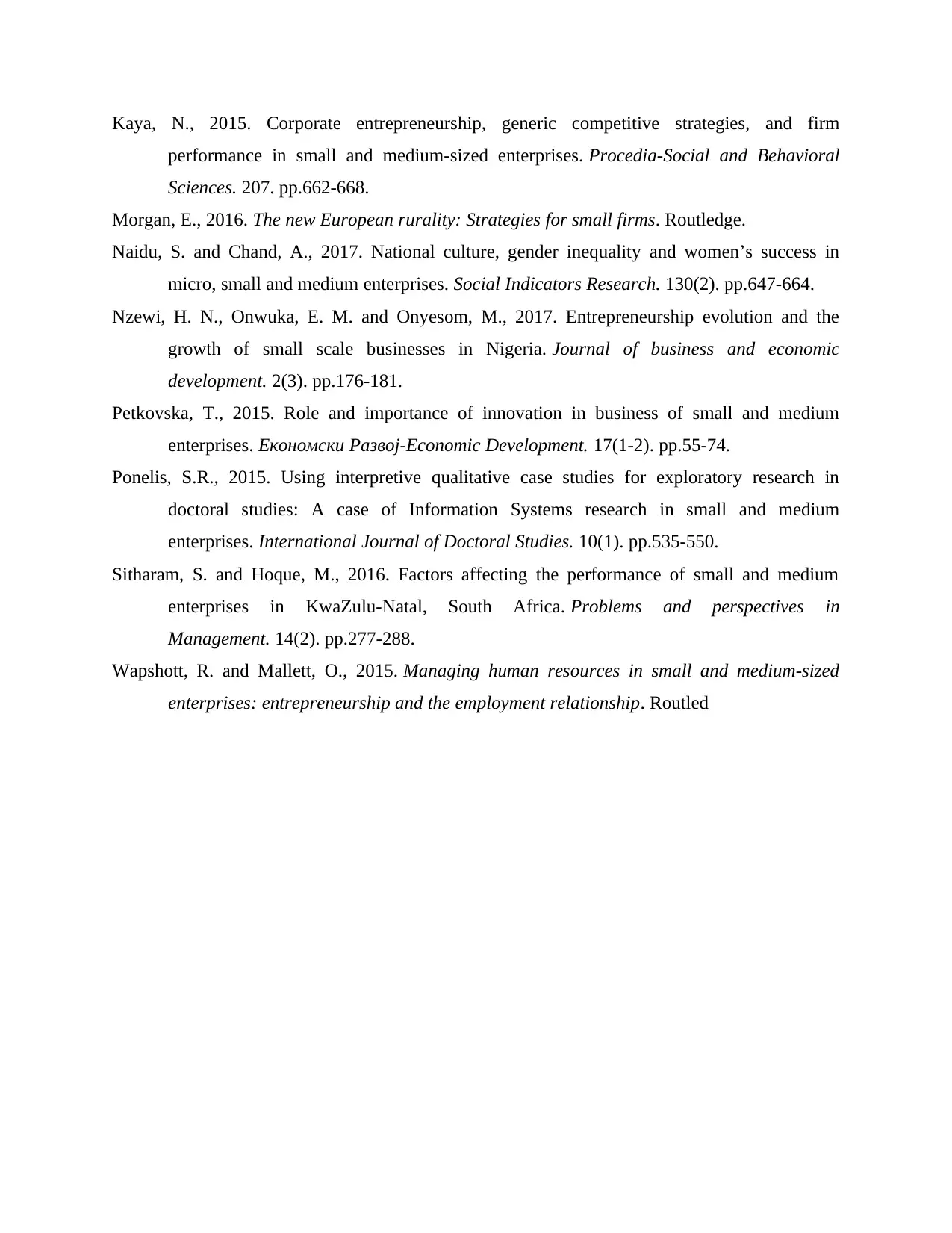
Kaya, N., 2015. Corporate entrepreneurship, generic competitive strategies, and firm
performance in small and medium-sized enterprises. Procedia-Social and Behavioral
Sciences. 207. pp.662-668.
Morgan, E., 2016. The new European rurality: Strategies for small firms. Routledge.
Naidu, S. and Chand, A., 2017. National culture, gender inequality and women’s success in
micro, small and medium enterprises. Social Indicators Research. 130(2). pp.647-664.
Nzewi, H. N., Onwuka, E. M. and Onyesom, M., 2017. Entrepreneurship evolution and the
growth of small scale businesses in Nigeria. Journal of business and economic
development. 2(3). pp.176-181.
Petkovska, T., 2015. Role and importance of innovation in business of small and medium
enterprises. Економски Развој-Economic Development. 17(1-2). pp.55-74.
Ponelis, S.R., 2015. Using interpretive qualitative case studies for exploratory research in
doctoral studies: A case of Information Systems research in small and medium
enterprises. International Journal of Doctoral Studies. 10(1). pp.535-550.
Sitharam, S. and Hoque, M., 2016. Factors affecting the performance of small and medium
enterprises in KwaZulu-Natal, South Africa. Problems and perspectives in
Management. 14(2). pp.277-288.
Wapshott, R. and Mallett, O., 2015. Managing human resources in small and medium-sized
enterprises: entrepreneurship and the employment relationship. Routled
performance in small and medium-sized enterprises. Procedia-Social and Behavioral
Sciences. 207. pp.662-668.
Morgan, E., 2016. The new European rurality: Strategies for small firms. Routledge.
Naidu, S. and Chand, A., 2017. National culture, gender inequality and women’s success in
micro, small and medium enterprises. Social Indicators Research. 130(2). pp.647-664.
Nzewi, H. N., Onwuka, E. M. and Onyesom, M., 2017. Entrepreneurship evolution and the
growth of small scale businesses in Nigeria. Journal of business and economic
development. 2(3). pp.176-181.
Petkovska, T., 2015. Role and importance of innovation in business of small and medium
enterprises. Економски Развој-Economic Development. 17(1-2). pp.55-74.
Ponelis, S.R., 2015. Using interpretive qualitative case studies for exploratory research in
doctoral studies: A case of Information Systems research in small and medium
enterprises. International Journal of Doctoral Studies. 10(1). pp.535-550.
Sitharam, S. and Hoque, M., 2016. Factors affecting the performance of small and medium
enterprises in KwaZulu-Natal, South Africa. Problems and perspectives in
Management. 14(2). pp.277-288.
Wapshott, R. and Mallett, O., 2015. Managing human resources in small and medium-sized
enterprises: entrepreneurship and the employment relationship. Routled

1
1 out of 15
Related Documents
Your All-in-One AI-Powered Toolkit for Academic Success.
+13062052269
info@desklib.com
Available 24*7 on WhatsApp / Email
![[object Object]](/_next/static/media/star-bottom.7253800d.svg)
Unlock your academic potential
© 2024 | Zucol Services PVT LTD | All rights reserved.





